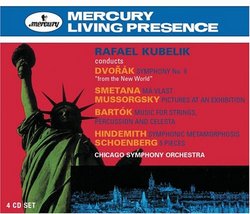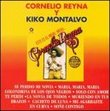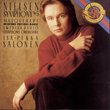| All Artists: Wolfgang Amadeus Mozart, Antonin Dvorak, Bedrich Smetana, Modest Mussorgsky, Bela Bartok, Paul Hindemith, Arnold Schoenberg, Zoltan Kodaly, Rafael Kubelik, Antal Dorati, Chicago Symphony Orchestra, George Schick Title: Rafael Kubelik conducts Dvorák, Smetana, Mussorgsky, Bartók, Hindemith, Schoenberg Members Wishing: 0 Total Copies: 0 Label: Philips Original Release Date: 1/1/2005 Re-Release Date: 9/13/2005 Album Type: Box set Genre: Classical Styles: Forms & Genres, Theatrical, Incidental & Program Music, Historical Periods, Classical (c.1770-1830), Modern, 20th, & 21st Century, Symphonies Number of Discs: 4 SwapaCD Credits: 4 UPC: 028947568629 |
Search - Wolfgang Amadeus Mozart, Antonin Dvorak, Bedrich Smetana :: Rafael Kubelik conducts Dvorák, Smetana, Mussorgsky, Bartók, Hindemith, Schoenberg
 | Wolfgang Amadeus Mozart, Antonin Dvorak, Bedrich Smetana Rafael Kubelik conducts Dvorák, Smetana, Mussorgsky, Bartók, Hindemith, Schoenberg Genre: Classical
|
Larger Image |
CD DetailsSimilar CDs
|
CD ReviewsThe Mussorgsky is a Delight B. Maupin | Atlanta, GA | 10/25/2006 (5 out of 5 stars) "I am not an "audio expert", but I do know what I like. And I love this CD. I heard this recording of Mussorgksy's "Pictures From an Exhibition" on an NPR program from The Chicago Symphony. I was very taken with the clarity of sound. I searched for the recording through Amazon and I am absolutely delighted. It is a four dsic set, but I haven't gone on to the other recordings (yet) becasue I keep re-playing this lovely piece. I hope you enjoy it." A nice collection of performances, but mixed sonics from 50 Santa Fe Listener | Santa Fe, NM USA | 06/01/2006 (4 out of 5 stars) "Audiophiles adore the Mercury Living Presence series issued throughout the early Fifties and Sixties, but for those of us who aren't specialty collectors, it's pretty clear that not evreything on MLP is a gem. This valuable colleciton (mono only) from the doomed tenure of Rafael Kubelik with the Chicago Sym.--he lasted only a few years before the local critic's stinging rebukes sent Kubelik packing in favor of Fritz Reiner--deserves detailed appraisal. CD 1: Kubelik was a lively, stylish Mozartean, and this 1953 Sym. #38 is quite lovely. It's more streamlined than Walter's recordings of the "Prague," but cut form the same affectionate cloth. The recording, however, is thin and shrill. I found it uncomfortable to listen to except at low volume. Kubelik recorded Dvorak's "New World" musltiple times; this Chicago reading dates from 1951 and is caught in sharp mono sonics with a bit too much stinging treble for my ears. Even so, there are those who think this lively, rather lean performance is one of Kubelik's best. I'm not sure that it's so special that one should do without stereo, but the choice is personal. The CSO plays superbly, and the general contour of the interpretation is straightforward. CD 2 is entirely given over to Smetana's Ma Vlast, another Kubelik specialty that he recorded multiple times. This 1952 recording sounds identical to the Dvorak on CD 1--a deep soundstage with lots of dynamic range. The interpretation is essentially moderate and unexaggerated. It's certainly stylish and has real sweep, too. In terms of dramatic impact CD 2 is far ahead of CD 1. CD 3: Curiously, there are audiophile purists who insist that the Golden Age of 50's mono produced better sound than any current digital recording. If that's a viable position (few outside the cult agree), the works on this CD are prime evidence. Kubelik's Pictures at an Exhibition and Bartok Music for Strings, Percussion, and Celesta were recorded in the spring of 1951. They are vivid and colorful, with tangy wind choirs and plenty of dynamic impact. Kubelik proves a restless, almost nervous interpreter of the Mussorgsky, which refreshes this warhose. Neither the recording nor the CSO's playing really matches the later, legendary RCA performance under Reiner, but Kubelik's reading has more sinew and rhythmic spring to it. He brings the same qualities to the Bartok, which gets a wiry "modernist" interpretation that's very appealing, less offical-sounding than the famous Reiner account. CD 4: At the start of this CD we are back to the thin sound of CD 1 (both were recorded in 1953 with the same Telefunken 201 micropone). For some reason, however, this disc can be played at louder volume without treble sting. Kubelik's Hindemith Symphonic Meatmorphoses is lean and propulsive. This is a refreshing take, but without gorgeous stereo sound the coloristic aspects of this showpiece can't be fully apreciated. Being too much of a modernist was a prime factor in getting Kubelik fired, which is all the more unfair because his Schoenberg Five Pieces for Orchestra is a standout, almost the performance of a lifetime. I hope somebody in the conservative Chicago audience appreciated how seductive and witty this performance was; if Schoenerg's masterpiece has ever sounded more like Daphnis and Chloe, I don't know when. The last two works were recorded in 1954 under Antal Dorait, and the sound remains a bit shrieky. But the itnerpretations of Kodaly's Peacock Variations and Bartok's Miraculous Mandarin Suite are excellent, full of energy and fierceness in the Bartok, making it as scary as the composer intended. Playing the shrill mono recording at full volume is impossibly masochistic on the ears, but the reading is terrific. Chicago was lucky--they exchanged a near-great conductor for a great one in Fritz Reiner. Mercury, however, lost the best conductor it would ever have, moving on to Dorati and Paray and more audiophile cult delights. " Truly Trail Blazing Performances and Recordings David Schwan | Chicago, IL United States | 02/23/2008 (5 out of 5 stars) "In April, 1951, Mercury Records began an ambitious series of recordings with the Chicago Symphony and its then-relatively new Music Director, the young Rafael Kubelik. In his mid-30s, Kubelik had high hopes for his new job, giving performances of the standard repertoire, but also championing new pieces. In his brief stay in Chicago (1950-1953) he gave 60 premieres! But for numerous reasons, all of which disheartening, Kubelik left and went back to Europe. However, he returned many times to guest conduct in Chicago, always greeted with enthusiasm and sparkling reviews, which one might say, gives the Kubelik/CSO story a happy ending.
But back to these recordings, made between 1951 and 1954. These are the treasured Mercury mono releases, all made with a single microphone and transferred to CD from the original master tapes. Yes, they may not hold up technically to recordings made in later years, but don't let that OR the fact that they're in mono keep you from getting this set. The well-balanced and focused sound (in most places) makes the fact that they're in mono a non-issue. As for the performances, I give them all high marks, particularly the "Pictures at an Exhibition" (although certain tempi may be too fast for some) and the Hindemith "Symphonic Metamorphosis," one of THE best ever recorded. The Bartok "Music for Strings, Percussion and Celesta" and the Schoenberg "Five Pieces" are truly ground-breaking, the Bartok being recorded in 1951, roughly six years after the composer's death. It doesn't have the intensity of Reiner's CSO recording, but it is worthy of repeated hearings. Antal Dorati came in early 1954 after Kubelik's departure to finish out Mercury's contract with the orchestra. His vivid, enthusiastic performances of the Kodaly "Peacock Variations" and Bartok's suite from "The Miraculous Mandarin" (music he had in his blood from Day One) happily are included here. While more and more Mercury recordings are disappearing, it's great to see this set still available. It should definitely be in any serious-minded listener's collection, if for no reason other than its historic significance." |

 Track Listings (7) - Disc #1
Track Listings (7) - Disc #1


